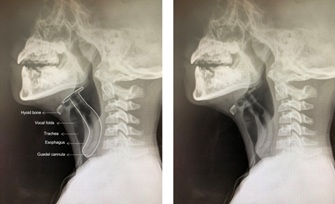
Persisstent Voice Disorders and Dysphagia after Orotracheal Intubation
*Corresponding Author(s):
Cinthia G PérezDepartment Of Respiratory Endoscopy, Hospital De Pediatría Juan P Garrahan, Buenos Aires, Argentina
Tel:+54 1163550528,
Email:cinthiaperezent@gmail.com
Persistent Voice Disorders And Dysphagia After Orotracheal Intubation
A 9-year-old male patient consulted at our department because of severe dysphagia, cervical contracture, excessive weight loss, and hot-potato voice that had started six months previously after orotracheal intubation due to an elective orthopedic foot surgery.
The patient had a normal oral examination and therefore, a lateral neck X-ray was requested in order to rule out subglottic stenosis or any other laryngeal lesion. An uncommon foreign body was found: A wrong-size Guedel cannula was lodged in the hypopharynx, placed at the esophagus entry protruding through the upper third of the tracheal pars membranacea into the airway lumen.
The extraction was performed with a Miller laryngoscope and Magill forceps without any complications. The video shows the laryngoscopy prior to the extraction see in below video, Supplemental Digital Content 1).
Supplemental Digital Content 1
Lateral neck X-rays should be part of the initial evaluation if laryngeal injury is suspected after intubation. They reveal not only normal or pathologic airway parameters as shown in image, but can also demonstratea radiopaque foreign body as labeled [1].
 Voice alterations and dysphagia are well-known postoperative complications after orotracheal intubation. Most of them are thought to be related to airway manipulation and are expected to resolve after a short period of time [2]. Persistent or worsening symptoms outside the immediate postoperative window warrant additional work-up and expansion of the differential diagnosis to include airway foreign bodies [2,3]. This can be done by performing an ordinary lateral neck X-ray and/or a fibrolaryngoscopy.
Voice alterations and dysphagia are well-known postoperative complications after orotracheal intubation. Most of them are thought to be related to airway manipulation and are expected to resolve after a short period of time [2]. Persistent or worsening symptoms outside the immediate postoperative window warrant additional work-up and expansion of the differential diagnosis to include airway foreign bodies [2,3]. This can be done by performing an ordinary lateral neck X-ray and/or a fibrolaryngoscopy.
Summary Statement
Dysphagia and voice disorders after a surgical procedure due to a medical foreign body.
Funding Statement
Support was provided solely from institutional and departmental sources.
Conflict of Interest
The authors declare no competing interests.
References
- Kamalipour H, Bagheri M, Kamali K, Taleie A, Yarmohammadi H (2005) Lateral Neck Radiography for Prediction of Difficult Orotracheal Intubation. Eur J Anaesthesiol 22: 689-693.
- Kahmke R, Woodard CR (2015) Dysphagia, Hoarseness, and Globus in a Postoperative Patient. Am J Otolaryngol 36: 310-311.
- Chen G, Luo Y, Pan H, Teng Y, Liang Z, et al. (2018) Uncommon Foreign Body in the Hypopharynx: A Case Report. Medicine 97: 26.
Citation: Labedz G, Pérez CG, Presa C (2023) Persistent Voice Disorders and Dysphagia after Orotracheal Intubation. J Otolaryng Head Neck Surg 9: 083.
Copyright: © 2023 Geraldine Labedz, et al. This is an open-access article distributed under the terms of the Creative Commons Attribution License, which permits unrestricted use, distribution, and reproduction in any medium, provided the original author and source are credited.

